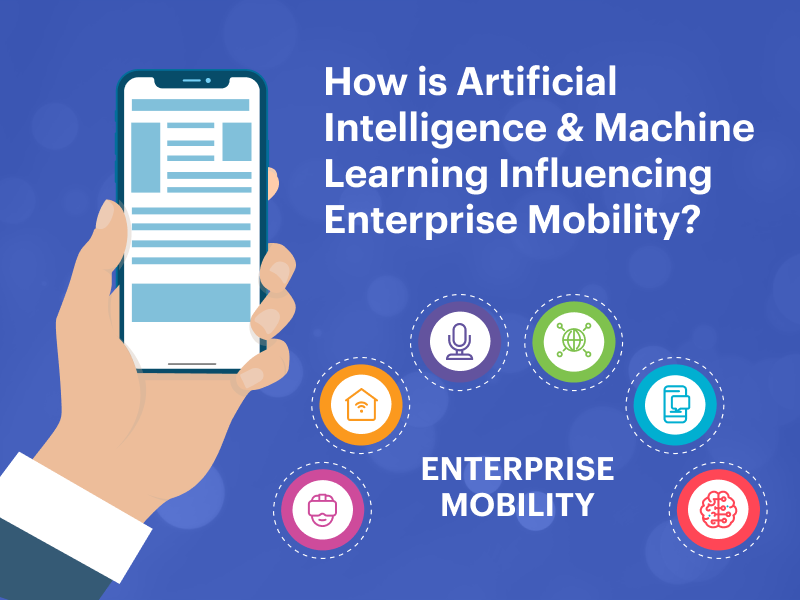With the increasing innovations in technology, the majority of the global community has started going digital. Every business owner thinks of taking their business online to make their services available for a more significant audience.

Technologies like Artificial Intelligence and Machine Learning are very popular for creating enterprise apps. These technologies keep evolving by each passing day and bring science fiction into reality. In this article, let’s understand what enterprise mobility is and how AI & ML influences enterprise mobility.
What is Enterprise Mobility?
Businesses believe in successfully integrating enterprise mobility into every level of work management. It is said that the success and growth of a business depend highly on how they have leveraged enterprise mobility. Enterprise mobility is the ability of an organization to use the latest mobile technologies to perform business activities and exchange information.
Read This: Top Enterprise Mobility Trends to Look Out for in 2020
Organizations are digitizing their tasks by adapting AI & ML to make the workflow more efficient and increase productivity. Here is a list of AI/ML-based technologies that are being used to influence enterprise mobility.
- BYOD Strategy
BYOD culture is becoming popular in companies. It increases the productivity of the employees as they can comfortably use their smartphones with AI capabilities in performing many tasks. Being powered by AI, the employees' devices can enhance the performance of documents & applications to improve functionality, reduce system delays, and boost business decision-making.
- Chatbots
Chatbots are integrated within the company’s enterprise mobility framework to provide advantages like enhanced employee experience and improve employee performance visibility. Besides this, the organization uses chatbots to fulfill multiple tasks like collecting all necessary information from the user and analyzing it while before replying.
- App Analysis
AI is a technology that aims at improving the business logic with the apps to make them capable of leveraging user gestures, speech, visual recognition, and interfaces. And on the other hand, ML is used to stream users’ activities. It provides insights about the users’ behavior and its app or service usage style.
- Data Mining & Predictive Analysis
AI & ML comes up with a set of tools that enables maintaining, collecting, and analyzing data. These tools help in understanding the relationship between the data and extract the conclusion out of it. This process of analyzing data is known as Data Mining.
Read This: Mobile App Development Cost Report 2020
Besides this, with the help of AI, companies can also carry out predictive analytics. Here the AI models can predict the pattern and outcome of the user behavior.
- Automated Reasoning
AI can provide automated reasoning to the companies. It analyzes the stored data that is previously used by the company and offers relevant information about the current situation. Big giants like Uber use this methodology. It collects already saved data of traveled routes and uses it in future trips.
Conclusion
With the increase in the acceptance of new technologies, the use of mobile devices with AI/ML-based features have also increased. It is stated that a mobile workforce will reach 18.7 billion people of the global workforce by 2020. The above-listed technologies have the capabilities to influence enterprise mobility and help companies expand their businesses. If you want an enterprise app with such functionalities, contact mobile app developers of OpenXcell, the AI ML development services & consulting company.

 Log in with Facebook
Log in with Facebook 






